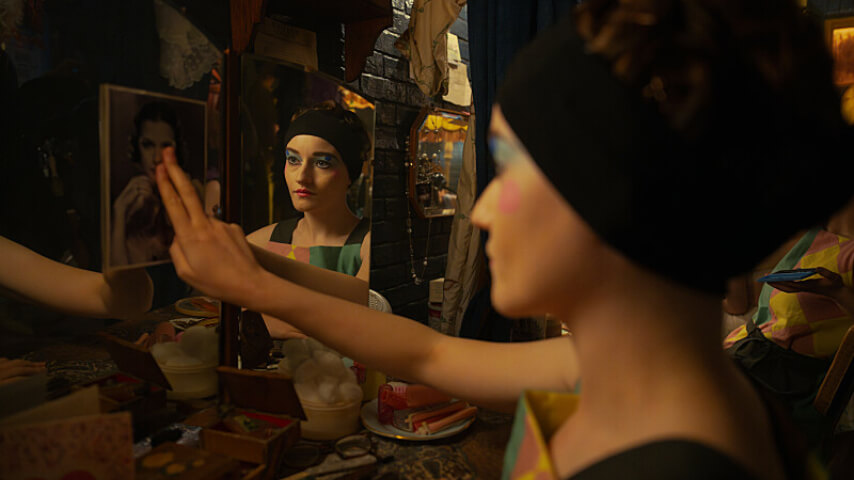The devil truly lies in the details of Apartment 7A, a prequel to the events chronicled in Ira Levin’s 1967 novel Rosemary’s Baby and Roman Polanski’s celebrated 1968 adaptation. While there are many commendable choices made throughout director and co-writer Natalie Erika James’ sophomore feature, they never coalesce into a successful narrative. Particularly considering the implicit pressure imposed on a film that invites comparisons to the Mia Farrow-starring original, it’s puzzling that Apartment 7A’s own ideas are hardly given a platform. Musings on motherhood, performance, and power are never fully articulated, leaving a flurry of concepts up in the air without resolve.
Julia Garner plays Terry Gionoffrio, a dancer whose budding career takes a downward turn after she severely injures her ankle during a performance. After months of healing, unemployment, and crashing with her friend Annie (Marli Siu), Terry finally lands an audition for a new play produced by big-shot Alan Marchand (Jim Sturgess). During her audition, however, she is humiliated and pushed to repeat a painful dance sequence before being unceremoniously dismissed. Sensing that she’s hurtling toward rock bottom, Terry makes the ill-advised decision to show up to Alan’s apartment in order to plead for the part. The doorman immediately turns her away; overwhelmed by anxiety, the young woman faints as she’s leaving the building. Elderly spouses Minnie (an impressively committed Diane Wiest) and Roman (Kevin McNally) Castevet rush to her side and urge her to recuperate in their apartment, located just a floor shy of the producer’s in the historic Bramford building.
If there’s one thing the Paramount+ exclusive has going for it, it’s the cast. Garner adds considerable depth to Terry’s character, who was portrayed by actress Victoria Vetri in Polanski’s film. Although her timeline never properly overlaps with Rosemary’s, as it did in the original, Terry’s story is virtually the same: she struggles with addiction (explained now as a response to chronic pain) and has been taken in by the Castevets, who’re helping get her back on her feet.
Wiest’s take on Minnie is incredible; her intense New Yorker inflection frequently veers toward overwrought, yet somehow retains a sense of novel veracity. As her presence shifts from matronly to malicious, Wiest preserves the character’s quirks as she also defines her specific brand of elitist evil. By far the most compelling scenes in the film solely involve Garner and Wiest (an at-home haircut with a menacing pair of scissors certainly stands out), with the former fleshing out a once minor role as the latter emulates and refines a character first embodied by Ruth Gordon. Both actors swing for the fences with their respective approaches, whether by channeling uneasiness incarnate or adhering to a wicked accent choice.
When Terry discovers she’s pregnant, she recalls the rapid inebriation she felt when paying Alan’s apartment a visit a few weeks ago. Fully aware that motherhood would be the death knell for her now flourishing career, she considers having an abortion. The Castevets beg Terry to have the baby, for they never were able to conceive and would happily adopt the child. The intergenerational relationship between Terry and Minnie, as well as the film’s interest in women’s familial “duties,” harken back to Relic, James’ feature debut. Centering on an elderly woman battling dementia while her daughter and granddaughter attempt to aid her during this violent decline, Relic features a genuine subversion of genre clichés involving women of all ages. In Apartment 7A, the feminist commentary is majorly lacking, though inklings of these thoughts are presented without a clear thesis: What compels us to fall in line with gendered mores? How much safety are we willing to compromise for money and success? Will we ever have permanent control of our bodies and what they’re used for?
It’s a shame that none of these ideas feel guided by James’ perspective, who co-wrote the screenplay alongside Skylar James and Christian White (who also co-wrote Relic). The project, which was originally conceived by Skylar James, is too beholden to source material that never gets properly revitalized. The tone of Apartment 7A is similar to the tense drama (and somberly cathartic conclusion) of Relic, but it never surpasses the dread of patriarchal subjugation that heightens the stakes of Rosemary’s Baby. Taking on a prequel for her second feature stunted James’ ability to conjure up her own world. Even Apartment 7A’s version of the Bramford and its New York City surroundings could have used quite a bit of fine-tuning. It doesn’t read as especially faithful or innovative, emitting a coldness characterized by an over-reliance on hollow ‘60s-era sets.
While this tepid IP project could have completely floundered in the hands of a less capable filmmaker, James’ Apartment 7A still doesn’t manage to hit the mark. Especially since viewers of Rosemary’s Baby distinctly remember how Terry’s arc plays out, Apartment 7A is far too fixated on connecting these dots as opposed to paving its own way. At a time when forced pregnancy is a very real horror that American women must grapple with (even at the cost of their freedom), you’d think that conjuring dread with the same topic, albeit with a Satanic spin, would be an easy task. Despite best efforts from Garner and Wiest to elevate the project, there’s only so much emotion one can add to an underdeveloped project before the effort starts to feel desperate.
Director: Natalie Erika James
Writer: Natalie Erika James, Christian White, Skylar James
Starring: Julia Garner, Dianne Wiest, Jim Sturgess, Kevin McNally
Release Date: September 27, 2024 (Paramount+)


 Keep scrolling for more great stories from A.V. Club.
Keep scrolling for more great stories from A.V. Club.